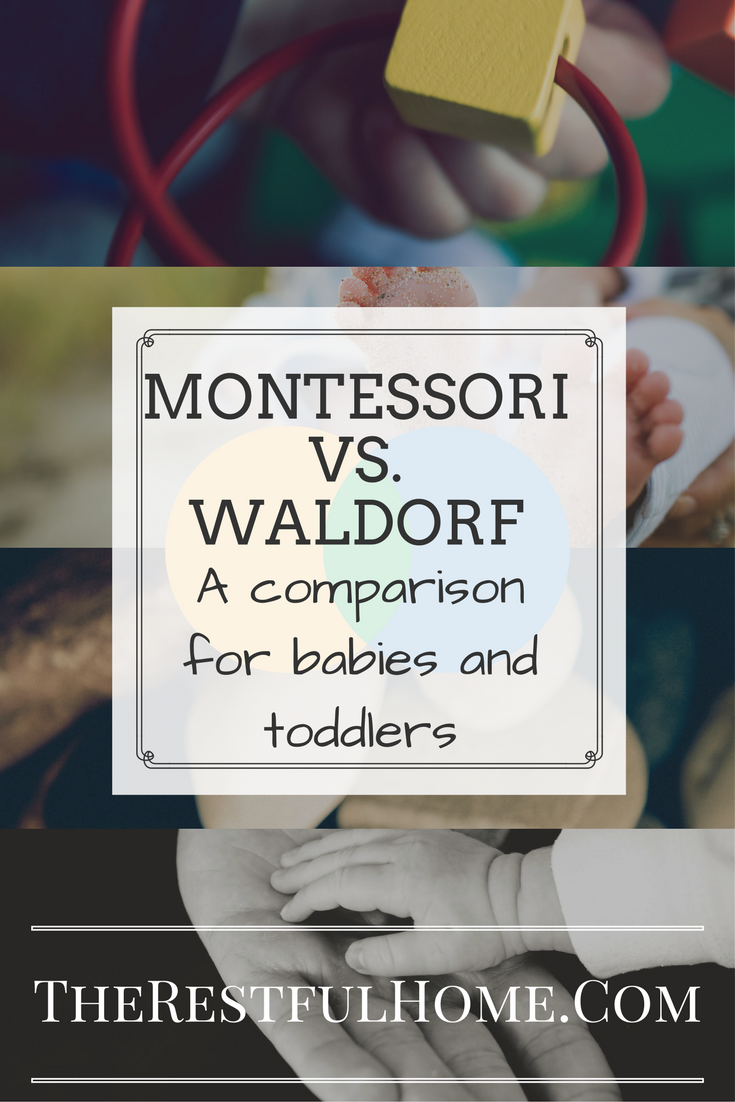
Montessori vs Waldorf: A comparison for babies and toddlers
Because education begins informally as soon as a child is born, I’ve been researching and playing with ideas for the past year for Baby J’s education. Part of that is the teacher in me, but I know every loving parent at some point has to make decisions about his/her child’s training. TV or no TV? What if we’re watching educational programs on TV? Plastic toys or only wooden? Barbies or no Barbies? Montessori or Waldorf or Classical or Traditional?
I remember reading about different educational philosophies while I was forming my own as I pursued a degree in middle school education. However, I focused on the middle school years. Now, with a baby in my life, I needed to look more closely at the preschool years. And if you consider Montessori and Waldorf philosophies, you’ll notice that they are not just for academics—they actually change your daily life with the smallest of babies. You’ll find yourself throwing out the plastic toys and playing with pebbles!
Let’s look first at the Montessori philosophy (simplified):
Who Developed it? Dr. Maria Montessori, in the 1900s. (Her first childcare program in Rome, Italy, opened in 1907. By 1910, “Montessori schools” had become famous.) Maria was a brilliant woman (and a feminist) and one of Italy’s first female physicians.
How Did It Begin? Maria became co-director of an institute for training teachers for special needs children. As she worked directly with the children, she experimented until she found ways to help them learn.
The Montessori philosophy is child-centered. It says that teachers (and parents) should guide children but not force or directly instruct them. Children up to three years apart in age are often integrated in a classroom (which happens naturally in a homeschooling family with several children). Everything children do that helps them learn something is called “work.” So, for example, if an older baby is experimenting with a basket full of only yellow items of different textures, that is her “work.” See? This happens at home.
Children work at their own pace, are usually not assigned grades, and are encouraged to set their own goals.
Here’s a little about the Waldorf philosophy (again, simplified):
Who Developed it? Rudolf Steiner, also in the early 1900s. Rudolf is also the founder of anthroposophy (the idea, rooted in German mysticism, that by developing your inward self you can experience the spiritual world). Note: It’s important to know what philosophers believed about things other than just education. Their spiritual beliefs impact their academic practices!
How Did It Begin? The owner of a cigarette company in Stuttgart, Germany asked Steiner to start a school for his employees’ children. Non-employees soon began asking to send their children to the school as well, and by the 1930s there were numerous Waldorf schools (many of which were later closed by the Nazis).
Waldorf philosophy is also child-centered, but focuses much more on the child’s imagination than Montessori. Children are constantly encouraged to express themselves creatively (through drawing/painting/singing/etc.) and spend time outside in nature. A constant schedule is usually maintained, with days for gardening or cooking. No technology is allowed, and there is no homework, grading, tests, etc., even when children are older. Like in Montessori schools, there are mixed-age classrooms. Babies are given toys that are as simple as possible and that are made with natural materials. (This is especially easy to implement in the home if you live in or near the country. Baskets of pine cones or pebbles are wonderful Waldorf toys.)
The Pros and Cons of Each System for Preschool-Aged Children
(I’m not addressing middle school/high school very much in this comparison.)
Montessori
Pros:
-Children aren’t pushed to perform academically before they’re ready.
–Montessori-inspired baby and toddler toys encourage development of both fine and gross motor skills, help toddlers begin to think logically, and aren’t inspired by TV shows!
Cons:
-Because this philosophy is so child-centered, there is a tendency for “Montessori parents” to let their children take the lead in the home before they are developmentally ready for that position. Very young children are not ready to be allowed to make a very large percentage of their own choices. They usually don’t reach that level of maturity until they are in their teen years.
Waldorf
Pros:
-Children spend a great deal of time enjoying being outside, getting their hands dirty, and doing real work.
-There is a predictable schedule, which makes a child feel safe.
Cons:
-Just like in a Montessori home, although not quite to the same degree, a Waldorf home can let the child take the lead before he is mature enough.
-Waldorf education, with its total exclusion of technology, may sound attractive, but probably isn’t the best preparation for a child in our modern world.
-Similarly, the lack of “normal” academic paraphernalia like tests and grading will not help a student who is college bound. I wouldn’t worry about that with a baby or preschooler, but if you’re deciding on a homeschooling track for older children you should probably consider this point.
So what will I do with Baby J?
I’ll probably take some ideas from both philosophies and then apply what works for my family, our beliefs, and our home. A day for gardening? Sure! Self-corrective Montessori puzzles? Yes! Low amounts of technology? Definitely—with the balance that I have to maintain so Baby J can still see his daddy via FaceTime when David’s on the road/in the sky. And I can’t have a fit when all the little guy wants to do is chew on a brightly-colored plastic toy.
I want to be flexible and enjoy life with my little boy!
